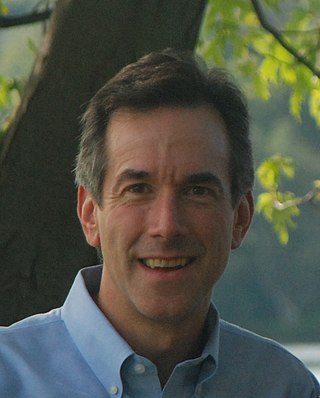A psychiatrist is a physician who specializes in psychiatry. Psychiatrists are physicians and evaluate patients to determine whether their symptoms are the result of a physical illness, a combination of physical and mental ailments or strictly mental issues. Sometimes a psychiatrist works within a multi-disciplinary team, which may comprise clinical psychologists, social workers, occupational therapists, and nursing staff. Psychiatrists have broad training in a biopsychosocial approach to the assessment and management of mental illness.

Dementia is the general name for a decline in cognitive abilities that impacts a person's ability to perform everyday activities. This typically involves problems with memory, thinking, and behavior. Aside from memory impairment and a disruption in thought patterns, the most common symptoms include emotional problems, difficulties with language, and decreased motivation. The symptoms may be described as occurring in a continuum over several stages. Dementia ultimately has a significant effect on the individual, caregivers, and on social relationships in general. A diagnosis of dementia requires the observation of a change from a person's usual mental functioning and a greater cognitive decline than what is caused by normal aging.

Stanley Ben Prusiner is an American neurologist and biochemist. He is the director of the Institute for Neurodegenerative Diseases at University of California, San Francisco (UCSF). Prusiner discovered prions, a class of infectious self-reproducing pathogens primarily or solely composed of protein. He received the Albert Lasker Award for Basic Medical Research in 1994 and the Nobel Prize in Physiology or Medicine in 1997 for prion research developed by him and his team of experts beginning in the early 1970s.
Vascular dementia (VaD) is dementia caused by problems in the blood supply to the brain, resulting from a cerebrovascular disease. Restricted blood supply (ischemia) leads to cell and tissue death in the affected region, known as an infarct. The three types of vascular dementia are subcortical vascular dementia, multi-infarct dementia, and stroke related dementia. Subcortical vascular dementia is brought about by damage to the small blood vessels in the brain. Multi-infarct dementia is brought about by a series of mini-strokes where many regions have been affected. The third type is stroke related where more serious damage may result. Such damage leads to varying levels of cognitive decline. When caused by mini-strokes, the decline in cognition is gradual. When due to a stroke, the cognitive decline can be traced back to the event.
The Potamkin Prize for Research in Pick's, Alzheimer's, and Related Diseases was established in 1988 and is sponsored by the American Academy of Neurology. The prize is funded through the philanthropy of the Potamkin Foundation. The prize is awarded for achievements on emerging areas of research in Pick's disease, Alzheimer's disease and other dementias.
Geriatric psychiatry, also known as geropsychiatry, psychogeriatrics or psychiatry of old age, is a branch of medicine and a subspecialty of psychiatry dealing with the study, prevention, and treatment of neurodegenerative, cognitive impairment, and mental disorders in people of old age. Geriatric psychiatry as a subspecialty has significant overlap with the specialties of geriatric medicine, behavioural neurology, neuropsychiatry, neurology, and general psychiatry. Geriatric psychiatry has become an official subspecialty of psychiatry with a defined curriculum of study and core competencies.
Steven T. DeKosky is the Aerts-Cosper Professor of Alzheimer's Research at the University of Florida (UF) College of Medicine, deputy director of UF’s Evelyn F. and William L. McKnight Brain Institute (MBI) and associate director of the 1Florida Alzheimer’s Disease Research Center.

Kenneth L. Davis is chief executive officer of the Mount Sinai Health System in New York City, an American author and medical researcher who developed the Alzheimer's Disease Assessment Scale, the most widely used tool to test the efficacy of treatments for Alzheimer's disease designed specifically to evaluate the severity of cognitive and noncognitive behavioral dysfunctions characteristic to persons with Alzheimer's disease. His research led to four of the first five FDA-approved drugs for Alzheimer's.
John Quinn Trojanowski was an American academic research neuroscientist specializing in neurodegeneration. He and his partner, Virginia Man-Yee Lee, MBA, Ph.D., are noted for identifying the roles of three proteins in neurodegenerative diseases: tau in Alzheimer's disease, alpha-synuclein in Parkinson's disease, and TDP-43 in Amyotrophic Lateral Sclerosis (ALS) and frontotemporal degeneration.

Alzheimer's disease (AD) is a neurodegenerative disease that usually starts slowly and progressively worsens, and is the cause of 60–70% of cases of dementia. The most common early symptom is difficulty in remembering recent events. As the disease advances, symptoms can include problems with language, disorientation, mood swings, loss of motivation, self-neglect, and behavioral issues. As a person's condition declines, they often withdraw from family and society. Gradually, bodily functions are lost, ultimately leading to death. Although the speed of progression can vary, the typical life expectancy following diagnosis is three to nine years.
Geriatric neurology is the branch of medicine that studies neurologic disorders in elderly.
Perminder Sachdev is an Indian neuropsychiatrist based in Australia. He is a professor of neuropsychiatry at the University of New South Wales (UNSW), co-director of the UNSW Centre for Healthy Brain Aging, and clinical director of the Neuropsychiatric Institute at the Prince of Wales Hospital, Sydney. He is considered a trailblazer in the field of neuropsychiatry. Sachdev's research interests include ageing, vascular cognitive disorders such as vascular dementia, and psychiatric disorders.
Geriatric psychology is a subfield of psychology that specializes in the mental and physical health of individuals in the later stages of life. These specialized psychologists study a variety of psychological abilities that deplete as aging occurs such as memory, learning capabilities, and coordination. Geriatric psychologists work with elderly clients to conduct the diagnosis, study, and treatment of certain mental illnesses in a variety of workplace settings. Common areas of practice include loneliness in old age, depression, dementia, Alzheimer's disease, vascular dementia, and Parkinson's disease.
Rosa Rademakers is an American neurogeneticist and professor within the Department of Neuroscience at the Mayo Clinic. Her research centers on the genetic basis of neurodegenerative diseases, such as identifying causal genes and their function, exploring familial risk factors, and the mechanism of the degeneration. Her neurodegenerative diseases of focus include "Alzheimer's disease (AD), frontotemporal dementia (FTD) and amyotrophic lateral sclerosis (ALS)." She received a Bachelor of Arts in Biology, a Master of Arts in Biochemistry, and a Ph.D. in Science, all from the University of Antwerp. Originally from the Netherlands, she came to the Mayo Clinic in 2005 for a post-doctoral fellowship, and in 2007 she was given a lab director position.
Constantine G. Lyketsos is the Elizabeth Plank Althouse Professor in Alzheimer's Disease Research in the Department of Psychiatry and Behavioral Sciences at the Johns Hopkins University, Baltimore, Maryland, United States. He is the founding director of the Richman Family Precision Medicine Center of Excellence in Alzheimer's Disease, and an associate director of the Johns Hopkins Alzheimer's Disease Research Center (ADRC).
Dennis J. Selkoe is an American physician (neurologist) known for his research into the molecular basis of Alzheimer's disease. In 1985 he became Co-Director of the Center for Neurological Diseases and from 1990, Vincent and Stella Coates Professor of Neurological Diseases at Harvard Medical School. He is also a Fellow of the AAAS and a member of the National Academy of Medicine.
Rachelle Smith Doody is an American neurologist and neuroscientist. She is known for her work on late stage development of drugs for Alzheimer’s disease, Parkinson’s disease, Huntington’s disease and other neurodegenerative disorders.
Gerard David Schellenberg is an academic neuropathologist who specializes in the research of Alzheimer's disease. He is the director of Penn Neurodegeneration Genomics Center as well as a professor of Pathology and Laboratory Medicine at the University of Pennsylvania. He is a leading contributor to Alzheimer's disease research.
The Women's Healthy Ageing Project (WHAP) is the longest ongoing medical research project examining the health of Australian women. Its landmark studies concern women's heart and brain health, a long-neglected area of specialised research.

Andrew E. Budson is an American neurologist, academic and researcher. He is a Professor of Neurology at Boston University School of Medicine, Lecturer in Neurology at Harvard Medical School, Chief of Cognitive and Behavioral Neurology and Associate Chief of Staff for Education at the Veterans Affairs (VA) Boston Healthcare System, where he also serves as a Director of the Center for Translational Cognitive Neuroscience. He is Associate Director and Outreach, Recruitment, and Engagement Core Leader at the Boston University Alzheimer’s Disease Research Center.





